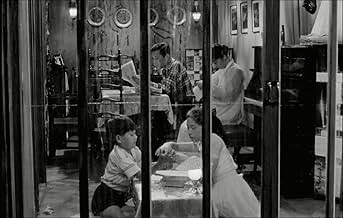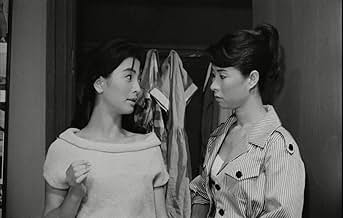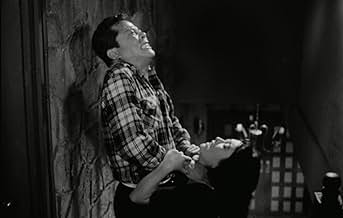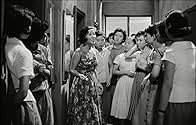A família de um compositor de piano muda-se para uma nova casa. Após sua esposa grávida desmaiar de trabalhar para sustentar a família, ele contrata uma empregada doméstica para ajudar nas t... Ler tudoA família de um compositor de piano muda-se para uma nova casa. Após sua esposa grávida desmaiar de trabalhar para sustentar a família, ele contrata uma empregada doméstica para ajudar nas tarefas de casa.A família de um compositor de piano muda-se para uma nova casa. Após sua esposa grávida desmaiar de trabalhar para sustentar a família, ele contrata uma empregada doméstica para ajudar nas tarefas de casa.
- Direção
- Roteirista
- Artistas
- Dong-sik Kim
- (as Jin Kyu Kim)
- Chang-soon Kim
- (as Sung-kee Ahn)
Avaliações em destaque
A well to do couple hires a maid to help out the wife with the chores around the house, but no sooner has she gone into the kitchen to get a glass of water than the entire household threatens to collapse in ruins of rat poison and unwanted pregnancies, illicit thrysts and alliances striken casually and alternatively between the wife and the maid who is now a mistress, the wife and the husband against the maid who they need to be rid off before she talks of the affair, the maid and the husband against each other and their own selves.
The other movie I've seen by Ki-young Kim is, Iodo, a Korean version of The Wicker Man that takes place in a remote island populated exclusively by fisherwomen. It was also utterly bonkers, the most outrageous plotting this side of Italian exploitation, but it lacked the ability to see that in itself, to recognize the madness and defy it. The Housemaid at first seems like the product of Ed Wood incompetence. Some of the dialogue and character behavior had me in stitches. But it soon reveals that to be a facade which the movie can lift and put back in place at whim, so that it can be all things to all people not because of any particular notion of ambiguity shared by Ki-young Kim because the movie is blunt like a hammer in the face, but because it doesn't abide by any notion of common sense or realism unless it wants to. The movie behaves with the same audacity of its maid protagonist. It sets up an image of a socially upwards mobile household where a couple can afford to buy a television even if it means hours of slaving away on a sewing machine to get it, and then affronts it violently, perversely toys with it and corrupts it to the heart.
In the end, if any more clue was required, we get fourth walls broken and a man winking straight at us. This is Panic Theater at its best, with the selfaware avant-garde tropes replaced by unselfconscious soap opera clichés.
The housemaid of the title is a dangerous female student who enters in the life of a married piano teacher trying to get love from him, no matter if the teacher's wife and kids will suffer so that they can be together. The teacher is controlled by both housemaid and the wife, and he needs to make a decision fast before things get worse for everyone. Here's a story about the value of family in the middle of betrayals, delusions, obsession, tradition, real love versus psychotic forms of love, and plenty of more keywords you may think.
At times "Fatal Attraction" appeared in my mind since there's a significant similarity between both films, and if the story sounds like cliché it is but you must see how it works and who is working with. We're talking about a Korean film and as some of us know, Asian females in older films didn't have the kind of roles the women had in here, powerful and energetic characters that almost boss around with the only men in the story like he was a puppy dog. And the villain? Oh boy! She was one of the most dramatic and perfectly well written villains of all time. Frightening, desperate to the point of threatening the teacher's kids who gets suspicious of everything she serves to them thinking they might get poisoned, this woman knows how to find a answer to everything in order to ruin people's lives, from false rumors to murder.
Don't be let down by the slowness of the first half hour (the characters introduction), try to stay focused all the time and you'll be totally surprised until the very last minute. This is a great film! 9/10
I can't rate it higher because i was not that excited during the first 40-50 minutes. This movie takes its time. I repeat, you think it is just an ordinary story, like a drama romance film noir of this era, with lovers thinking the same old schemes etc. No, it's not. This is way too original and creative. Of course way better than the mediocre 2010 version. The 2010 HANYO is not good. But this is.
Icing on the cake: The last minute. I couldn't believe my own eyes, i watched it three times, that indicates how much i loved it.
In fact, it is the polar opposite. It turns out that "The Housemaid" is actually an overtly conservative film. This film is undebatably a defense of traditional family values like faithfulness, fidelity, and monogamy. Another film with a virtually identical plot could have just as easily been an attack on those same values. In "The Housemaid", however, the character of the maid is not the instrument of revolution, the hand of Marxist justice that has come to wipe out every trace of bourgeois society from our microcosmic household (e.g. Dirk Bogarde's character in "The Servant"); rather, she is the face of temptation, the tantalizer that will be the destruction of a healthy, happy family, should the patriarchal figure fall into that inescapable abyss of adultery.
Some viewers have interpreted the film in other ways, though I don't see how they could. This isn't that kind of film. There really isn't anything ambiguous here. The only exception — the one place where interpretation of the film's message might become a bit convoluted — is the framing device that Kim uses at the film's bookends. I would note the likelihood that this was added for the sake of the censors. After all, it is somewhat surprising that Kim got this film passed in the first place, and the frame story, which abruptly obliterates the reality of the film's central storyline, may have been the only reason he was able to do so. Despite my usual partiality for any kind of narrative complexity or nonlinear structure, I felt this device was mildly detrimental to the film's integrity. Regardless, it really doesn't change anything about the nature of the film's message.
Thematically, the key moment in the film comes fairly early on, immediately after the decisive act of infidelity. Kim goes to great lengths to underline this instant as the pivotal moment in the lives of his characters, a moment from which there will be no return. He achieves this rather heavy-handedly, by cutting away from the room in which the action occurs, to a shot of a large tree standing outside the house, which is immediately struck by lightning, as if to make it abundantly clear, written in Fuller-esque boldface type: This is the moment that changes everything! This is the undoing of a family!
It's not a subtle film, needless to say. There are, however, master touches throughout. The cinematography is certainly impressive, as is Kim's direction. The laterally panning shots through the plate glass on the upper floor of the house are fantastic. It is quite a well shot film, and Kim works inspiringly within the limited space of only a few settings.
Dramatically, however, "The Housemaid" was somewhat disappointing. The film can't decide whether it wants to be a Buñuelian art film or a Hitchcockian thriller, and the resulting blend is very uneven, increasingly as the film progresses. Kim never gives this film any real, constant identity. The score was quite poor. With its obtrusive and highly transparent attempts at creating tension and coercing the viewer into a certain emotion, it never ceased to intrude on the viewing experience.
This may be a political film — it certainly has a plainly conservative message — but if it is, it's not because Kim intended it to be. Despite being pressured by his government to foray into political filmmaking on a few occasions, Kim himself was not particularly interested in politics. He once said, "North or south, capitalist or communist, ideology is far less interesting to me than the things that divide the sexes."
Indeed, this is evident in "The Housemaid". Kim is clearly much more interested in the boundaries and barriers between men and women — the impediments that obstruct the path to intimacy and healthy relationships — than he is in any specific political ideology. And this is where the film regains some of its composure. Comparisons have been made to the work of Luis Buñuel and Shôhei Imamura. I can see it, in terms of its portrayal of passion and conflicted attempts at intimacy between the sexes, but on the whole I think those are pretty loose comparisons. "The Housemaid" works best as a psychological drama. When we analyze the motives of the characters, and what drives each of them toward their respective actions, the film comes into focus fairly nicely. When it tries to move into suspense, however, it looses its momentum as a drama, and as a successful, cohesive work of cinema.
All things considered, I think this is a good film. I can't call it a masterpiece, or even a great film, although I know many feel that way about it, but I do think it's quality cinema that's worth seeing. My biggest complaint with the film is its extreme lack of subtlety, in multiple facets of the art of filmmaking. Dramatically, "The Housemaid" goes way over the top one too many times, and thematically, the film essentially boils down to a cautionary tale about adultery and infidelity. Nonetheless, it's a film that deserves to be seen, especially with the relatively small place that South Korea occupies in the cinematic landscape.
RATING: 7.33 out of 10
Você sabia?
- CuriosidadesThis was the first and the last film Eun-shim Lee (Myung-sook) starred in. The public hated immoral Myung-sook so much that no director hired her after this film. [She may not have had a starring role, but she was hired for two films after this movie and also appeared in one movie previously.]
- Erros de gravação(at around 1h 29 mins) The girl, Ae-soon, gets out of bed surprisingly quickly and effortlessly for a young woman needing crutches.
- Citações
Dong-sik Kim: What does the law state about a man who cheats on his wife?
Lyu: [laughs] Sometimes he can get a lighter sentence than for a traffic violation. Once his wife forgives him, he's acquitted. Just as you wouldn't tell your son you're a murderer of a thief, even between couples some things should be kept secret.
- ConexõesFeatured in O Gosto do Dinheiro (2012)
Principais escolhas
Detalhes
- Tempo de duração1 hora 49 minutos
- Cor
- Mixagem de som
- Proporção
- 1.37 : 1





















